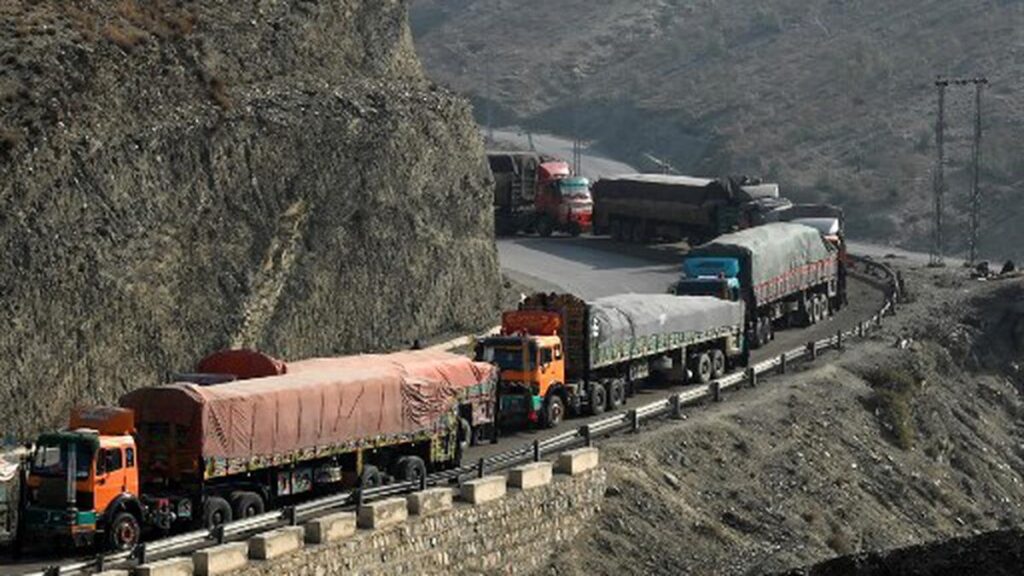Review of Afghanistan developments
Since Pakistan’s establishment, tensions have consistently existed in the relations between Afghanistan and Pakistan, primarily stemming from territorial disagreements and divergent interests. In the meantime, Afghanistan, which is landlocked, has relied heavily on transit routes through Pakistan, particularly the port of Karachi, to reach open waters. This reliance has become a significant leverage point for Islamabad to exert pressure on Kabul.
Border closures, particularly during crucial periods, have become a regular occurrence in Pakistan. Even during the time of the US military presence in Afghanistan, notably under Ashraf Ghani’s administration, Pakistan frequently shut down the Torkham and Spin Boldak borders. During the Taliban’s governance, when tensions between the two nations reached unprecedented levels, Pakistan consistently closed its borders with Afghanistan for various reasons, aiming to exert economic and political pressure on Kabul. The most recent border closure took place in early March 2025, when Pakistani officials restricted access at the Torkham border for both travelers and commercial goods for a duration of one month.
Afghanistan’s threefold strategy for addressing the transit issue
Recognizing Pakistan’s strategic exploitation of this transit route, Afghanistan has pursued three distinct approaches to liberate itself from dependence on Pakistan.
The Afghan authorities initially perceived Chabahar Port as a viable alternative to Karachi Port. The history of negotiations between Afghan governments and Iran regarding the use of Iranian ports extends back several decades. It is said that the slogan “water for port” originated during the 1971 negotiations between Afghanistan and Iran, which were led by Mohammad Musa Shafiq, the Afghan Prime Minister, and Amir Abbas Hoveida, the Iranian Prime Minister at the time. The Afghan government aimed to secure the right to utilize Iranian ports in return for a water agreement during these discussions.
The Khaf-Herat railway is a new beacon of hope for Afghanistan, facilitating increased trade with other countries. This railway will provide affordable access to the Turkish and European markets, which are among Afghanistan’s key objectives. Therefore, the Taliban government is firmly dedicated to constructing the fourth phase of this railway to bring the transit project to fruition.
In recent years, Afghanistan has made a second attempt to lessen its dependence on the transit route through Pakistan. This strategy focuses on transferring some trade and transit activities to its northern neighbors by fostering stronger political and economic relationships with Central Asian countries. During Ashraf Ghani’s presidency, there was a concerted effort to enhance trade with Central Asia and develop new transit routes via the northern corridor, but these initiatives were not successful.
As the Taliban government emerged and a degree of security was established in northern Afghanistan, the landlocked Central Asian nations expressed their support for Afghanistan’s transit initiatives. They began to collaborate with Afghanistan to secure access to open waters.
As the Taliban government emerged and a degree of security was established in northern Afghanistan, the landlocked Central Asian nations expressed their support for Afghanistan’s transit initiatives. They began to collaborate with Afghanistan to secure access to open waters. As a result of this cooperative strategy, Afghanistan’s trade volume with the five Central Asian countries has now nearly reached $3 billion.
The Wakhan Corridor project represents Afghanistan’s third effort to liberate itself from reliance on Pakistan’s transit routes, aiming to establish a connection with China. Given its strategic geoeconomic position, Afghanistan has the potential to connect with China via the Wakhan Corridor. Although this initiative was conceived during the Ashraf Ghani administration, the prevailing insecurity and Afghanistan’s dependence on the United States hindered its progress. Following the Taliban’s rise to power and the emergence of complex challenges in Kabul-Islamabad relations, the Taliban government is now actively pursuing this project, with some road infrastructure in the Wakhan Corridor already completed.
Should this project be executed, it will remove the necessity of importing Chinese goods via Pakistan and, from a geopolitical perspective, it will establish a vital transit corridor linking Iran to China.
Challenges Facing Afghanistan’s threefold strategy
Chabahar Port represents Afghanistan’s first chance to break free from dependence on Pakistani ports; however, it is currently unable to attain the needed capacity due to India’s failure to honor its commitments. The advancement of Chabahar Port was granted an exemption from US sanctions under the administrations of Barack Obama, Joe Biden, and the earlier term of Donald Trump. India Ports Global was expected to invest $85 million in the port; however, recent comments from Iranian officials suggest that the Indian company has not made any concrete moves in this direction. Following Donald Trump’s reinstatement to power, the exemption from sanctions for Chabahar Port has been rescinded, which may lead to a greater withdrawal of Indian involvement in this project than previously observed.
The second strategy, aimed at reallocating some trade and transit activities to Central Asian countries, is hindered by the limited capabilities of these nations. Moreover, the road connections from northern Afghanistan to the central and southern areas are not optimal. The Salang Tunnel, which serves as the only critical link from the north to the center, is often unsuitable for heavy traffic for several months annually due to snow. Additionally, Central Asian countries do not benefit from geographical closeness to Pakistan. As a result, reliance on northern neighbors for transit will continue at its existing level until the joint efforts of Afghanistan and Central Asia are completely executed.
The third proposal, which involves constructing a road from the Wakhan Corridor to China,is still far from realization. The acting Minister of Public Works (Roads) from the Taliban government recently stated during a meeting with the Chinese ambassador that the study of the Wakhan Corridor has been finalized and The ambassador indicated that Beijing would be open to the idea of utilizing the corridor if security issues are addressed. However, China’s reluctance to engage in further discussions about this with Kabul indicates that its security worries are still pronounced. It appears that China fears that the establishment of this transit route could lead to increased instability in the sensitive Xinjiang province, stemming from potential security threats originating from Afghanistan, which is why it remains cautious.

The Taliban government is likely aware of the challenges posed by the three plans discussed and is emphasizing the importance of negotiations, even in light of Islamabad’s unusual behavior regarding the closure of transit routes.
Recommendations
The issues plaguing Afghanistan-Pakistan relations seem to be fundamentally ingrained, and there appears to be little hope for resolution at this time. Consequently, Kabul must adopt the following actions to safeguard the effectiveness of its three-pronged approach against Pakistan’s tactical exploitation of transit routes that directly impact the Afghan economy.

















